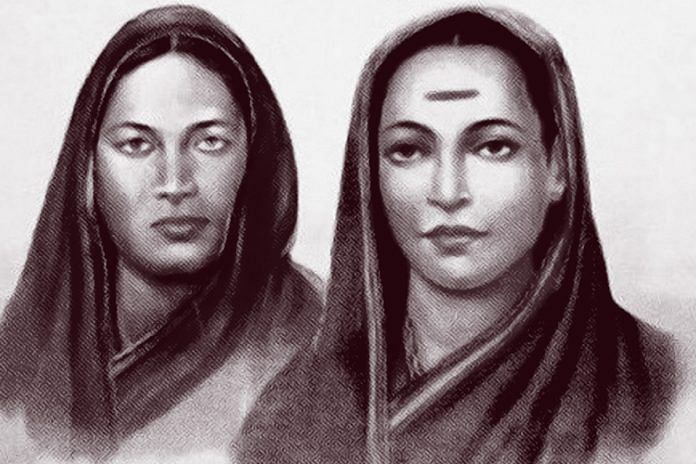
Thank you dear subscribers, we are overwhelmed with your response.
Your Turn is a unique section from ThePrint featuring points of view from its subscribers. If you are a subscriber, have a point of view, please send it to us. If not, do subscribe here: https://theprint.in/subscribe/
Savitribai Phule was an Indian Social Reformer, educationalist, and poet from Maharashtra. Along with her husband, Mahatma Jotiba Phule, in Maharashtra she played a very important and vital role in improving women’s rights in India. She is considered to be the pioneer of India’s feminist movement.
Savitribai Jyotirao Phule was born in a farmer’s family on January 3,1831 at Naigaon in Satara District. She was the eldest daughter of and father Khandoji Neveshe Patil. In 1840, at the age of 9, she was married to Jyotirao, who was only 13 at that time. After marriage Savitribai and Jyotiba settled down in Pune.
Savitribai Phule, the first female teacher of the women’s school in India and is a pioneer figure. She relentlessly fought against the dominant caste system and worked towards the upliftment of the marginalized.
In 1852, Savitribai Phule started the Mahila Seva Mandal to raise awareness about women’s rights in India. Savitribai called for a women’s gathering where members from all castes were welcome and everybody was expected to sit on the same mat. She also started the Home for the Prevention of Infanticide in her house, a place where Brahmin widows could deliver their babies safely. They could leave the child there if they could not take care of it. In fact, Savitribai also adopted a child, Yashwant, who was born at the shelter. She simultaneously campaigned against child marriage, while supporting widow remarriage.
Jyotiba and his colleagues saw the need for an organization that served the interests of non Brahmins and started Satyashodhak Samaj in 1873. After Jyotiba’s death in 1890, Savitribai carried forward the work of the organization and also chaired the annual session held at Saswad in 1893. A woman chairing a session in those times was revolutionary in itself. She initiated the first Satyashodhak marriage – a marriage without dowry, Brahmin priests or Brahminical rituals. Yashwant, too, had a Satyashodhak inter-caste marriage.
In her letter to Jyotiba (published in A Forgotten Liberator: The Life And Struggle Of Savitribai Phule), Savitribai talks about an incident that took place in 1868 at Naigaon. A Brahmin boy was on the verge of being killed by villagers for his “unholy” alliance with a Dalit girl when Savitribai intervened. She writes, “I came to know about their murderous plan. I rushed to the spot and scared them away, pointing out the grave consequences of killing the lovers under the British law. They changed their mind after listening to me.” Even a century and a half later, we still witness caste-based killings.
Be Self –reliant, Be industrious
Work –gather wisdom and riches,
All get lost without knowledge
We become animal without wisdom,
Sit idle no more, go get education
End misery of the oppressed and forsaken,
You’ ve got a golden chance to learn
So learn and break the chains of caste.
Throw away the Brahman’s scriptures first.
– Poem by Savitribai Phule
Ambedkarite Student’s Association, TISS Mumbai celebrated 192nd Savitribai Phule Birth Anniversary with a lecture on “Savitribai Phule and the Caste Question in Contemporary India”
The lecture held on 4 January 2023, at TISS Old Campus.
The Speaker for the lecture was Dr. Sai Thakur, Assistant Professor, and Centre for Study of Social Exclusion and Inclusive Policies, Tata Institute of Social Sciences, Mumbai. The other guests were Prof. Sangita Thosar, Dr. Asha Achuthan, both are Assistant Professor, Advanced Centre for women’s studies, School of Development Studies, TISS. And Dr.Sheetal Kamble, Senior Research Associate at Centre of excellence in Teacher Education at TISS, Mumbai. Anchors for the lecture were Tarun, a student of development studies 1st year and Ektha, a student of women studies 1st year.
Dr. Sai Thakur in her speech mentioned about the how Savitribai Phule is relevant today in contemporary times in India. Savitribai written number of poems and three letters to Jotiba Phule and she had also delivered 4-5 speeches. She wrote one long ballard in the memory of Jotiba Phule. Three main points first rewriting of history- Phule wrote Gulamgiri (Slavery)and we can see reflections of that in her poem also. Second is that their thoughts and work on the issue of education. The third issue, which speaker called OBC problematic, the whole issue of dalit and obc alliance and non alliance. Dr. Sai Thakur speak concluded her speech by speaking briefly on this three issues.
With lecture, there was nice long discussion was also happened on the questions from the students. Group of girls also sang a song on Savitribai Phule written Shital Sathe.
Vote of thanks was done Prapti Shamkuwar, a student of B.ed.- M.ed,2nd Year
These pieces are being published as they have been received – they have not been edited/fact-checked by ThePrint.
Also read: Amid caste clashes, it’s worth remembering Savitribai Phule on her birth anniversary

COMMENTS